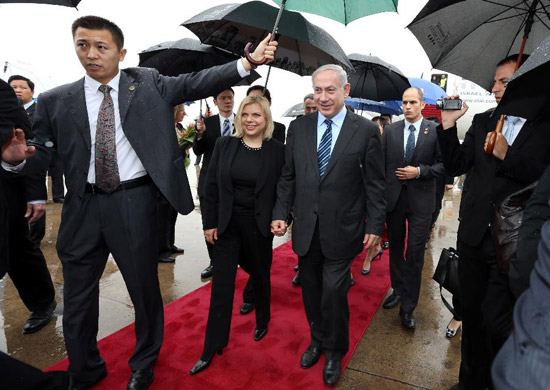
 |
| Israeli Prime Minister Benjamin Netanyahu arrives at the Shanghai Hongqiao Airport in east China's Shanghai, May 6, 2013. Netanyahu arrived in Shanghai for a visit on Monday. (Xinhua/Fan Jun) |
After Obama was re-elected U.S. president, the U.S. activated the mediation mechanism between Palestine and Israel. Palestine and Israel have given more conciliatory gestures and said they are willing to return to talks. The international community also feels the urgency of solving the Israeli-Palestinian problem.
In this context, Palestinian President and Israeli Prime Minister pay visits to China nearly at the same time. These two neighboring countries have been enemies for 65 years. The top leaders haven’t had contacts except in the United States. Now their successive arrival in Beijing shows their expectations and trust in China.
China has always been promoting peace talks between Israel and Palestine. In 2002, China appointed the Special Envoy on the Middle East issue to mediate among Palestine, Israel and other Arabic countries. China has made some constructive proposals and contributions to Palestinian-Israeli peace talks.
China has unique conditions to make contributions for the Mid-East peace. Although the Middle East has the most ethnic contradictions and communal conflicts in the world, China has maintained good ties with all of the countries and has a good reputation in this region. China has established a new type of relations with countries in Middle East, which is proved by the simultaneous visits of Abbas and Netanyahu.
China has a comprehensive diplomacy. China’s new leaders have had contacts with top leaders of dozens of countries in the world after they assumed office. China’s door is also open to the Middle East.
Read the Chinese version: 巴以首脑会北京透露什么信号(望海楼), source: People's Daily Overseas Edition, author: Hua Liming

















 2 killed, 1 injured in man's street knife attacks in Beijing | Attacker named
2 killed, 1 injured in man's street knife attacks in Beijing | Attacker named


![]()
